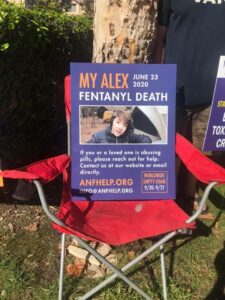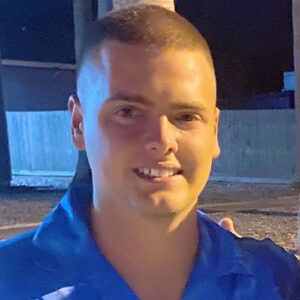We recently featured Tonya Doucette and Amy Neville on The Recovery and Company Podcast. Both of these moms lost their sons to illicit fentanyl. What makes their deaths even more tragic is that both of these boys were deceived. They had no idea the pill they were getting contained illicit fentanyl. It was a mistake that cost them their lives. “He took one pill,” says Tonya Doucette, who lost her son Trey to fentanyl poisoning on November 23rd 2020. “He made a ten second decision to take one pill and it had enough fentanyl to kill a room full of people. He never knew what was coming. He didn’t know there was fentanyl in that pill. A lot of people are deceived these days.”
Alexander Neville was just 14 years old when he lost his life to illicit fentanyl in June of 2020. “He came home at 9 o’clock, said good night, and that was it. The following morning, I went to wake him for his orthodontist appointment and he was gone,” said Amy Neville, Alexander’s Mom. “He looked like he was sleeping on his bean bag chair.  His shoes were off and beside him. His phone was charging on the wall and that was it. The paramedics came and his dad started CPR. It was just too late. They pronounced him dead at 9:59 AM on June 23rd and the treatment center called me back at 10:03 AM. I get very emotional about this.”
His shoes were off and beside him. His phone was charging on the wall and that was it. The paramedics came and his dad started CPR. It was just too late. They pronounced him dead at 9:59 AM on June 23rd and the treatment center called me back at 10:03 AM. I get very emotional about this.”
At the time of Alexander’s death, Amy had no idea that her son was taking counterfeit pills containing fentanyl. “We thought we were still dealing with the old narrative” said Neville. “Somebody stole grandma’s pills and is selling them to friends. That hardly exists anymore, but we did not know about that. No one was talking about fentanyl at the time. We weren’t prepared. We thought we were prepared, but we were not prepared. We thought we were doing everything we were supposed to be doing.”
Since no-one was talking about fentanyl, Amy and her family were completely blindsided. “It was beyond shocking to begin with and then we were so confused, like how did he take so much Oxy that he died? It just didn’t make any sense to us. That day narcotics task force from another county actually came to our home as a favor to my sister in law. That’s when we got our fentanyl education unfortunately.”
Amy says the stigma around addiction is why people are not talking about fentanyl. “People have this perception of we don’t have a drug problem in my family so I don’t need to listen to this messaging. You hear about fentanyl on the news, it’s just like a scary movie monster. They don’t know the history of it. They don’t know the deception behind it. So it doesn’t land, the information just doesn’t land. It lands for those of us in the bubble, we understand it, but we need to get outside that bubble, and get people to understand that this is very real,” says Neville. “None of these people deserved to die, all the way to those in the deepest throws of addiction. They deserved to be helped, and to be saved, but with fentanyl they’re not getting that chance.”
Those of us who are older probably remember experimenting with drugs or knowing people who did. It was very rare that it ever led to them losing their lives. “Back in the day you could experiment with drugs, says Doucette. “These days you just cannot take a chance. They can’t even make a mistake. If they make one mistake it could be their life.”
The challenge for many parents is they tend to want to compare their experience with what their kids are experiencing, but it’s much different today with fentanyl on the scene. “Adults have a lot of favorable attitudes towards drugs these days” says Neville. “I turned out fine so my kid will be fine, it’s just a phase. We know from the CDC that at least 44 percent of kids at some point, high school students, will try drugs. Five or ten years ago maybe that wasn’t such a big deal. Now that could be the only time because they could lose their life. I tell people that because we are not dealing with this old drug narrative situation. The experimental phase is deadly. If anyone knows someone they think is experimenting they need help and they need it immediately. Had we known about fentanyl on Sunday June 21st we would have reacted very differently. We would have taken him to the ER. We would have recognized he was being poisoned over the course of the ten days when these things were going on. And unfortunately, we didn’t have the information.”
Not only can the experimental phase be deadly, but illicit counterfeit fentanyl is beginning to monopolize the drug market and many people are being deceived. “These pills are pressed out to look like Xanax, Percocet, Oxycodone, Adderall, you name it, they are completely counterfeit and being passed off as legitimate prescriptions, and then things like meth and cocaine are being laced with it,” says Neville. She wants people to know that just because your family may not have a drug problem, it does not make them immune to the risk of fentanyl.  “This can happen in any family. I hear it all the time from people, well my kids would never do that. Could your kid be the young lady who went away to college, the first big party of the year, and had really bad menstrual cramps and a friend says ‘oh here take this’ and she is gone? Or the boy who was really nervous about a first date and a friend is like ‘oh here take this Xanax’ and it’s counterfeit? He doesn’t know this, he takes the Xanax and never gets on that first date. Those are very real examples of people thinking they are getting a legitimate prescription and it going really badly.”
“This can happen in any family. I hear it all the time from people, well my kids would never do that. Could your kid be the young lady who went away to college, the first big party of the year, and had really bad menstrual cramps and a friend says ‘oh here take this’ and she is gone? Or the boy who was really nervous about a first date and a friend is like ‘oh here take this Xanax’ and it’s counterfeit? He doesn’t know this, he takes the Xanax and never gets on that first date. Those are very real examples of people thinking they are getting a legitimate prescription and it going really badly.”
Amy also feels like schools need to do a better job of educating youth about drugs. “What makes me bananas is these schools have these drug prevention weeks and they gamify it. ‘Wear red today in support of drug awareness.’ ‘Dress like a cowboy to give drugs the boot.’ ‘Wear pajamas to dream drugs away.’ We have to stop that. We’re making a fun game out of something that’s very serious, and we need to treat it as such, from a very young age. What kid is at a party faced with drugs and is like ‘oh yea, remember that time in third grade when we wore cowboy boots, we shouldn’t do drugs.’ That’s not happening. If we don’t have those conversations, they are going to learn from their friends, and learn from the drug dealers, and learn from the internet. Our kids don’t like to listen to us. Bring in a third party. I will get on a zoom call with you and your family if you are in another state and we can talk about this. I will tell them the realities. Enlist help. You don’t have to do this alone.”
In addition to fentanyl education, both Neville and Doucette are strong proponents of carrying Narcan. Narcan is an opioid antagonist—meaning that it binds to opioid receptors and can reverse and block the effects of an overdose. “Every single person needs to have Narcan” says Doucette.  “Even if you don’t know anyone who is suffering. I keep it in my purse at all times. I tell people go to your pharmacy, they can give you Narcan and if they can’t, they can provide you with resources in your area where you can get free Narcan. I wish I would have had that chance with my son. They told me within ten minutes he was gone.”
“Even if you don’t know anyone who is suffering. I keep it in my purse at all times. I tell people go to your pharmacy, they can give you Narcan and if they can’t, they can provide you with resources in your area where you can get free Narcan. I wish I would have had that chance with my son. They told me within ten minutes he was gone.”
Both of these amazing women are using the tragedy of losing their sons to help others. Neville is founder of The Alexander Neville Foundation. She has dedicated her life to spreading awareness about the dangers that took her son’s life. Doucette started Project Trey to educate families about the dangers of all drugs. “It’s a challenge every day, says Doucette. “Project Trey has given me something to put my pain toward, to help someone else, to do anything I can to save a life. If it saves one life it is worth it. We are putting our pain to purpose to teach about fentanyl, and how important it is to learn what fentanyl is, how potent it is, and how dangerous it is. Whatever we can do to save a life. We don’t want Trey’s life to go in vain. Whatever we can do to help someone else out there.”
At The Life Change Center we treat individuals suffering from heroin, fentanyl, and pill addiction. If you or a loved one needs help, please contact us. We can help.
